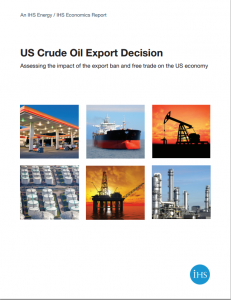Full Title: U.S. Crude Oil Export Decision: Assessing the impact of the export ban and free trade on the US economy
Author(s): IHS Energy
Publisher(s): IHS Energy
Publication Date: May 1, 2014
Full Text: Download Resource
Description (excerpt):
A secure supply of oil—and keeping a lid on gasoline prices—is a fundamental US interest. It is supported across the political spectrum because of its importance to the economy, the daily livelihood of Americans, and energy security. Policy regarding crude oil exports will play a key role in shaping how successfully the US accomplishes these objectives in the years ahead. Since the 1970s, the United States has effectively banned the export of crude oil. The ban was a reaction to the tumult and crises in the world oil market—the 1973 oil embargo against the United States, the nationalization of oil-producing assets held by Western companies, and the 1978 Iranian Revolution. It was also a response to the conviction that the United States was “running out of oil”.
But closer examination finds that the ban was even more specific to the 1970s and the debates of those years. One purpose was to ensure that new North Slope oil coming through the Alaska pipeline was not shipped to Asia. The other was an essential part of the abstruse system of the 1970s oil price controls—to prevent cheaper “old oil” from earning a higher price on the world market. The oil price control system was completely eliminated in 1981. But the ban on exports, a key element of that system, remains in place 33 years later as the last vestige of a price control system long gone.
The export ban was aimed at ensuring US-produced crude oil would stay in the United States. However, this ban, until recently, was of little practical relevance. US crude oil production was in a long period of decline, falling by half between 1970 and 2008. Shrinking domestic output was readily accommodated by a refining system that was increasingly dependent on oil imported from far-flung sources. But the oil market that prevailed in the 1970s—and even as recently as the early 2000s—no longer exists.
